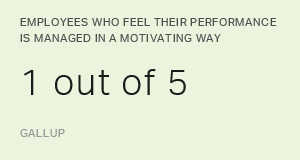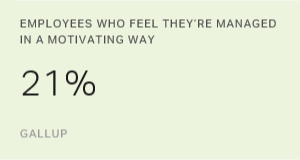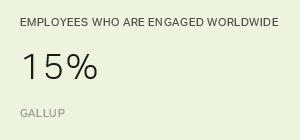According to our recent State of the Global Workplace report, 85% of employees are not engaged or actively disengaged at work. The economic consequences of this global "norm" are approximately $7 trillion in lost productivity. Eighteen percent are actively disengaged in their work and workplace, while 67% are "not engaged." This latter group makes up the majority of the workforce -- they are not your worst performers, but they are indifferent to your organization. They give you their time, but not their best effort nor their best ideas. They likely come to work wanting to make a difference --- but nobody has ever asked them to use their strengths to make the organization better.
In a nutshell, this global engagement pattern provides evidence that how performance is managed, and specifically how people are being developed, is misfiring. Most of modern business relies on annual reviews to provide feedback and evaluate performance. And yet the new workforce is looking for things like purpose, opportunities to develop, ongoing conversations, a coach rather than a boss, and a manager who leverages their strengths rather than obsessing over their weaknesses. They see work and life as interconnected, and they want their job to be a part of their identity.
While this may sound like a tall order, the roadmap to better management is clear. Here are three steps organizations can take immediately to boost engagement:
- Audit your current performance management system. Dissect which parts support setting clear expectations, making it easy to be an ongoing coach, and holding people accountable in a fair and accurate manner. There are undoubtedly pieces of your current system that align with modern performance development and others that work against allowing productive ongoing conversations to take place.
- Train your managers to have effective performance development conversations. There are five conversations your managers need to become experts on, from onboarding to check-ins to semi-annual progress reviews.
- Build a scientific system to make the right decisions about who becomes a manager and who can naturally deal with the idiosyncrasies that come with managing people. Some individuals are more naturally gifted to manage people toward high performance than others.
Performance reviews are still important. However, they become much more useful to the employee and organization if reviews follow ongoing conversations where expectations can be reprioritized in real time so that development can happen throughout the year. The review meeting, then, is not a surprise, but rather becomes a discussion about the future.
When we get performance management right, engagement will naturally rise. And the potential impact on the bottom line is significant. When compared with business units in the bottom quartile of Gallup's database, those in the top quartile of engagement realize 10% higher customer metrics, 17% higher productivity, 20% higher sales and 21% higher profitability. Organizations at the top achieve earnings per share growth that is more than four times that of their competitors.
Clearly, the health of the world's organizations depends on getting employee engagement right -- and that begins with fixing the problems within our performance management systems.



